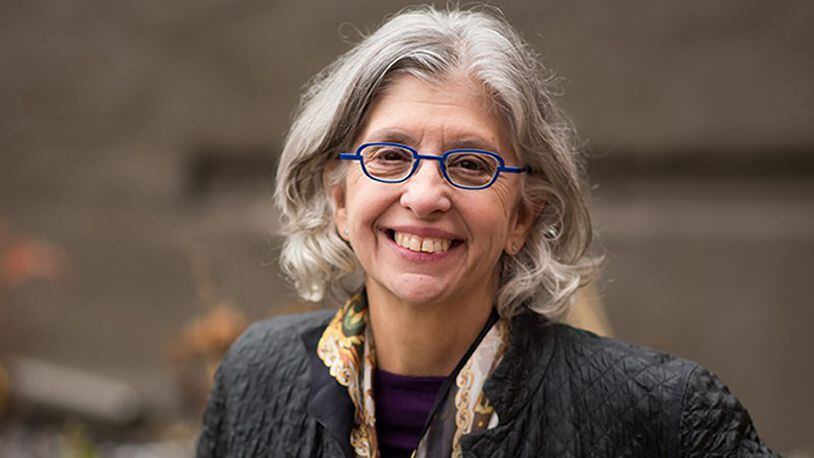“We hear our neighbors’ stories, and stories are vital to understanding each other,” she said.
Ellis, our Daytonian of the Week, tells us about herself and how the radio station connects the community.
You came to WYSO in 2009 from Washington, D. C. after 30 years as a radio documentary producer. What brought you to the Miami Valley?
My husband Noah Adams and I left Washington, DC to be closer to family and return to the heart of the country. I’m from Valparaiso, Ind., he’s from Ashland, Ky. In 2003, we spent a summer in Yellow Springs, researching the Wright brothers and we felt happy here, so when I was offered the general manager’s job at WYSO five years later, it was easy to say yes.
How do you think radio as a news medium contributes differently than print and television mediums?
On the radio, the sounds of voices and life bring dimension and deep meaning that print alone rarely provides. It’s a nuanced and powerful three-dimensional medium and as a radio maker, I find it full of artistic possibilities. Silence has meaning on the radio. You can hear pride. You can hear anger. As a listener, you can bond with people on the radio and they become your companions through good times and bad. They ride in the car with you on your way to work. They talk to you late into the night from around the world. Radio is a medium with the power to connect people.
Why is a local radio station like WYSO important to a community?
When radio takes LOCALNESS seriously, the community gets to hear its own voices and music. We hear our neighbors’ stories and stories are vital to understanding each other. Dayton’s Marlon Shackelford, a long-time community activist, says, “we can only grow if we know the story.” I agree with him wholeheartedly. WYSO tries to tell the story of the community every day.
What inspires you about the Miami Valley?
I’m inspired by the way people step up and reach out. I arrived in the wake of the 2008 economic crash. Businesses were failing, unemployment was high, people were losing their homes, schools were struggling. I see churches and community groups and neighborhood organizations, universities and non-profits searching for solutions. The effort is sincere. It doesn’t always succeed, there are far too many people here for whom the American dream seems out of reach, but I don’t see people giving up. I love that striving spirit here.
I also love the natural beauty of this area, the old trees, the prairies in deep summer, the rivers and the big blue sky full of huge puffy clouds.
How has your role changed at WYSO?
My role at WYSO has been evolving in response to its needs since I arrived. Early on, I needed to listen: to the staff and the community, to learn what was needed to rebuild trust in WYSO. Soon I had to articulate a vision and be a voice for that vision. We started Community Voices to welcome the community back to the station and onto the air, and began to broaden the on-air family, welcoming African-American voices, more women’s voices and young people and more kinds of music to better reflect our local histories. When we moved our studios and increased our power, my leadership took on a new shape and when it became possible to obtain the license, reaching out to donors became a focus. Leadership needs to respond to the times, to provide guidance and resources to the staff, to speak the mission passionately and frequently. I’ve tried to respond to the needs of the staff and volunteers, to the bottom line and to WYSO’s community of listeners.
Credit: Dennie Eagleson
Credit: Dennie Eagleson
You run The Center for Community Voices. Can you explain the aim of the program?
In July of last year, I became executive director of The Eichelberger Center for Community Voices at WYSO and Luke Dennis took over as general manager of WYSO and president of Miami Valley Public Media, a change that’s been planned for a long time. The center has grown out of the training we began in 2010 and its purpose is to bring more local voices and more local stories to the air, to continue training, empowering local people to tell stories and eventually to teach our engagement model to other public radio stations and independent producers around the country.
What role do you see WYSO playing during the coronavirus pandemic?
During the coronavirus pandemic listening to WYSO has increased because people need news, music and storytelling. Trustworthy news is a matter of life and death. People need information from Washington and Columbus and Miami Valley news, too, they need to know how their leaders are responding, how the communities are faring, how to keep themselves and their families safe. They also need music to soothe them and inspire them, to let them rest and reflect. At WYSO, we provide some of each.
What would be your perfect day in the Miami Valley?
My perfect day is spent with my husband, Noah, and starts with a quiet morning on the porch, reading the papers, listening to the radio. Then a visit to downtown Yellow Springs, and the Farmer’s Market, with no deadlines, so we have time to talk to the farmers and our friends. In the afternoon, there’s a swim or a walk in Glen Helen. Then, dinner with good friends with a long farewell on the porch, squeezing in one more story.
What’s your guilty pleasure?
I love naps, especially to the sound of a baseball game in the background.
About the Author
